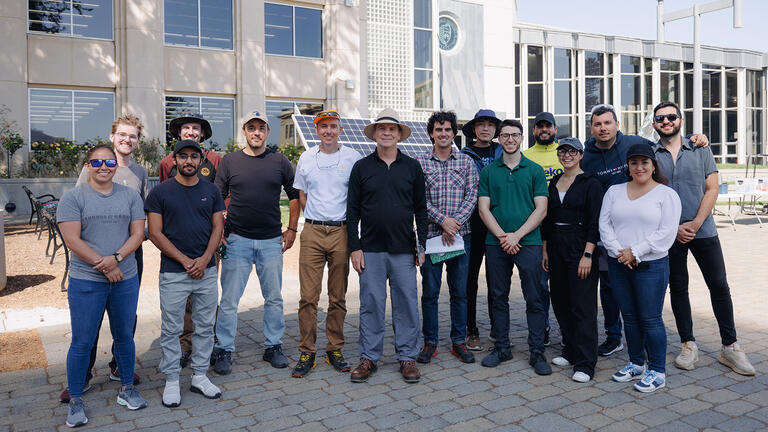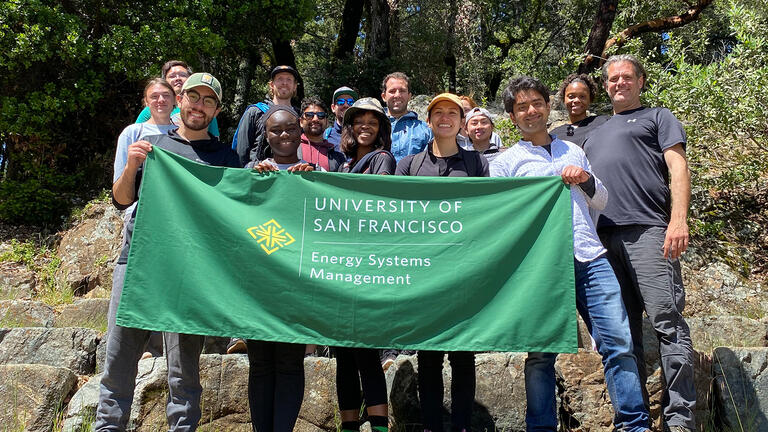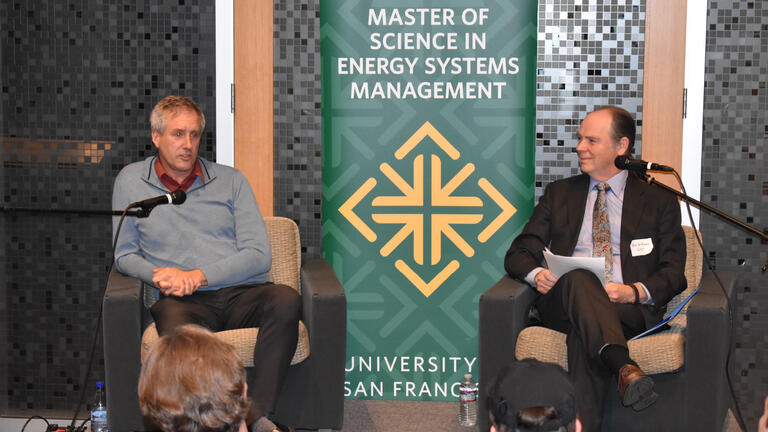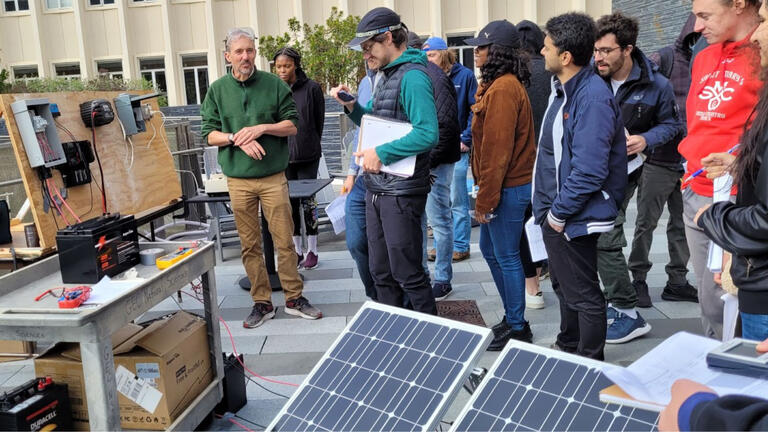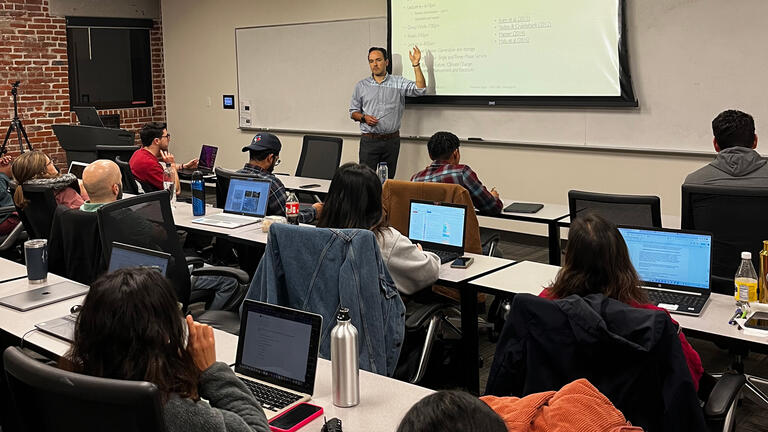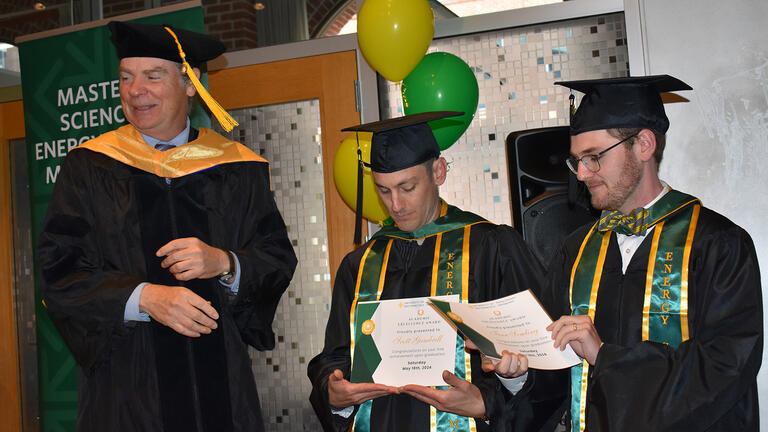
Program Overview
The M.S. in Energy Systems Management program brings together diverse and highly motivated students from a wide range of academic and professional backgrounds, both U.S. and international. The two-year course of study meets the needs of both full-time students and working professionals, with classes held on weekday evenings at USF's downtown San Francisco campus.
Our unique curriculum was designed by globally recognized energy experts and is frequently updated to reflect the latest developments in the field. A step-by-step sequence of rigorous but highly rewarding courses builds a multi-disciplinary foundation while developing top-notch professional skills. The coursework is organized into three areas: energy science and technology, energy business and finance, and energy policy and regulation.
Build a Multi-Disciplinary Foundation
Our unique curriculum was designed by globally recognized energy experts and is frequently updated to reflect the latest developments in the field.
A step-by-step sequence of rigorous courses builds a multi-disciplinary foundation while developing top-notch professional skills.
Program Specifics
-
The program begins on Tuesday, August 19. Please visit the Academic Calendar for other important dates.
-
Classes are held on weekdays from 6:00 to 9:30 p.m.
Our Interdisciplinary Curriculum
Environmental Impacts
The energy transition is being driven primarily by the need to reduce its impact on the environment, including on earth’s climate, air and water quality, land use, biogeochemical cycles, and biodiversity. Learn to quantitatively model these problems based on the scientific principles that underlie the energy field.
Energy Technologies
Learn about conventional and emerging energy technologies including wind, solar, energy storage, fossil and alternative fuels, nuclear power, electricity generation, building energy, and transportation. Develop scientific energy analysis methods and data-acquisition skills by doing weekly problem sets.
Electricity Systems
Dive deeply into the planning and operation of electric power systems, including the history, economics, and regulation of electric utilities, grid engineering principles, and the fundamentals of generation, transmission, and distribution. Understand what will be needed to make an electricity system with very high levels of intermittent wind and solar generation reliable and affordable.
Microgrids
Microgrids are a fast-growing technology that provide both basic energy needs in developing countries and makes power grids more climate resilient. Learn how microgrids are designed, financed, and delivered, including hands-on experience with small stand-alone systems.
Energy Modeling
Learn energy modeling methods including Excel tools, Python scripts, optimization, load forecasting, production simulation, and capacity expansion. Apply them to problems ranging from vehicle electrification and wind turbine power curves to microgrid design and utility resource planning.
GIS for Renewable Energy
Learn the principles of GIS (geographic information systems) and their application to the planning of wind and solar farms and transmission lines. GIS is a key emerging technology for building low-carbon infrastructure while protecting ecosystems.
Energy Economics
Develop a foundation in economic analysis methods, economic history, and ecological economics. Learn how to apply these to electricity production and use, market scheduling and load balancing, demand-side consumer choice, environmental policy, and the problem of externalities.
Renewable Energy Finance
Dive into the financial aspects of renewable energy in both front-of-the-meter and behind-the-meter applications. Learn about solar power project development, power purchase agreements, pricing project risk, federal and state tax incentives, evaluation of bids, book accounting, and tax equity.
Capital Markets and the Energy Sector
Become familiar with corporate finance issues in the energy sector. Learn how environmental, social, and governance (ESG) risk factors differ across the industry, and develop an analytical framework to assess impacts on financial statements and valuation.
Energy Policy
Learn about U.S. and California energy policy, with a focus on decarbonization and the electricity sector. Study the policy frameworks underlying renewable energy development, vehicle and building electrification, distributed energy resources, and energy efficiency.
Energy Law
Learn the principles of energy law, focusing on the regulated electricity and natural gas industries. Understand the relationship of law to regulation, different regulatory systems, cost-of-service ratemaking, market-based rates, industry deregulation and renewable energy case law.
Energy Industry Strategies
Learn corporate strategies related to deployment of advanced technologies, changes in market structures, and customer choice. Discover how these strategies affect the organizational decisions of the key actors including utilities, technology companies, regulatory agencies, and advocacy organizations.
Energy Research
Take a deep dive into topics of interest to you in class projects, internships, and your masters project, drawing from faculty and industry expertise. Learn how to scope a problem, acquire data, do scientific analysis, make figures, display and present results, and write a research paper.
Integrated Resource Planning
Develop a long-term integrated resource plan (IRP) for an electric utility of your choice. IRPs include load forecasts, impacts of vehicle and building electrification, load and resource tables, capacity expansion modeling, production cost modeling, and impacts on emissions, revenue requirements, and rates.
Go Farther, Faster
Consider the Energy Systems Management, MS/MBA. Build your skills in business and sustainable energy management. Earn two advanced degrees. Save time and the cost of 14 units. Graduate with both degrees in as few as 36 months.




